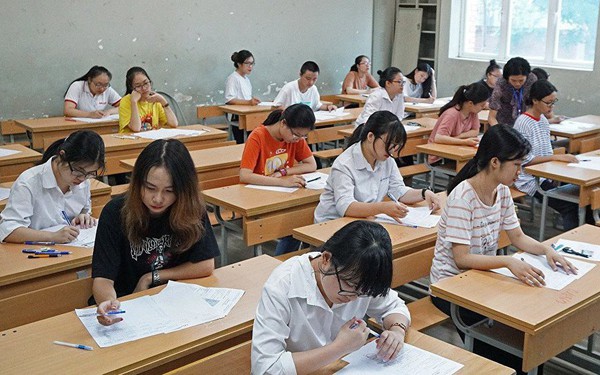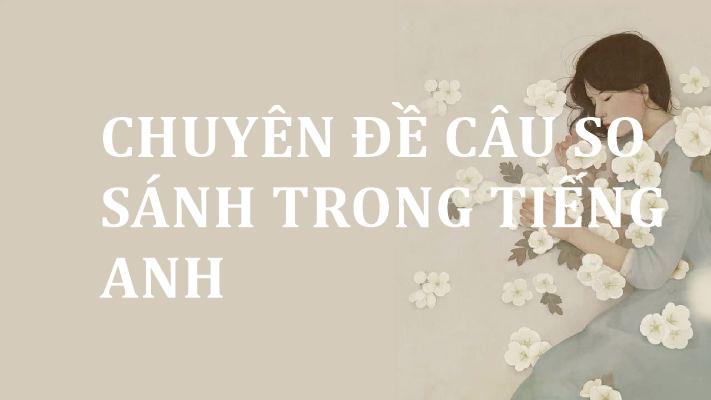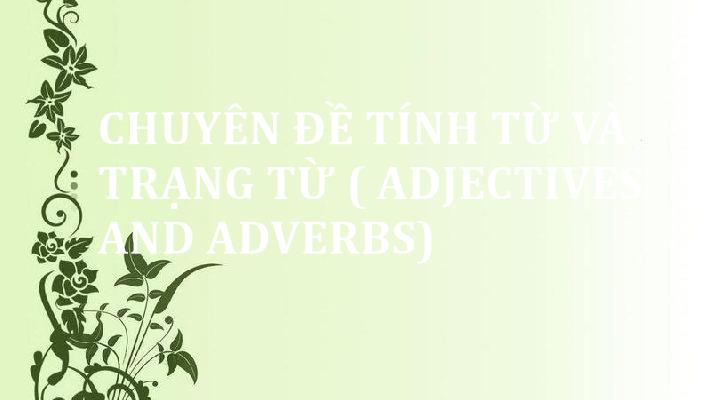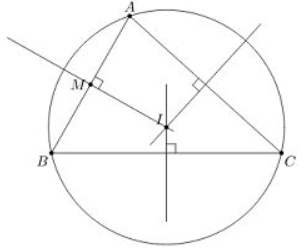UNIT 8: CELEBRATIONS
(CÁC NGÀY LỄ)
I.NEW WORDS:
- celebration (n) lễ kỷ niệm
- celebrate (v) làm lễ kỷ niệm
- Easter (n) lễ Phục Sinh
- Lunar New Year Tết Nguyên Đán
- wedding (n) đám cưới
- throughout (prep) suốt
- occur (v): happen/ take place xảy ra, diễn ra
- decorate (v) trang trí
- decoration (n) sự trang trí
- sticky rice cake bánh tét
- be together: gather tập trung
- apart (adv) cách xa
- Passover (n) Lễ Quá Hải (của người Do Thái)
- Jewish (n) người Do Thái
- freedom (n) sự tự do
- slave (n) nô lệ
- slavery (n) sự nô lệ
- as long as miễn là
- parade (n) cuộc diễu hành
- colorful (a) nhiều màu, sặc sỡ
- crowd (v) tụ tập
- crowd (n) đám đông
- crowded (a) đông đúc
- compliment (n) lời khen
- compliment so on sth khen ai về việc gì
- well done Giỏi lắm, làm tốt lắm
- congratulate so on sth chúc mừng ai về
- congratulation lời chúc mừng
- Congratulations! Xin chúc mừng
- first prize giải nhất
- contest (n) cuộc thi
- active (a) tích cực
- charity (n) việc từ thiện
- nominate (v) chọn
- activist (n) người hoạt động
- acquaintance (n) sự quen biết
- kind (a) tử tế
- kindness (n) sự tử tế
- trusty (a) đáng tin cậy
- trust (n) sự tin cậy
- express (v) diễn tả
- feeling (n) tình cảm, cảm xúc
- memory (n) trí nhớ
- lose heart mất hy vọng
- miss (v) nhớ, bỏ qua, trễ
- tear (n) nước mắt
- groom (n) chú rể
- hug (v) ôm
- considerate (a) ân cần, chu đáo
- generous (a) rộng lượng, bao dung
- generosity (n) tính rộng lượng, sự bao dung
- priority (n) sự ưu tiên
- sense of humour tính hài hước
- humourous (a) hài hước
- distinguish (v) phân biệt
- in a word: in brief/ in sum tóm lại
- terrific (a): wonderful tuyệt vời
- proud of tự hào, hãnh diện
- alive (a) còn sống
- image (n) hình ảnh
II.GRAMMAR:
A.RELATIVE CLAUSES :
Mệnh đề quan hệ trong tiếng anh (mệnh đề tính từ) bắt đầu bằng các đại từ quan hệ: who, whom, which, that, whose hay những trạng từ quan hệ: why, where, when. Mệnh đề quan hệ dùng để bổ nghĩa cho danh từ đứng trước nó.
*** CÁC ĐẠI TỪ QUAN HỆ:
1. WHO:
- làm chủ ngữ hoặc tân ngữ trong mệnh đề quan hệ
- thay thế cho danh từ chỉ người
● ... N (person) + WHO + V + O
E.g: I told you about the woman.She lives next door.
=> I told you about the woman WHO lives next door.
2. WHOM:
- làm túc từ cho động từ trong mệnh đề quan hệ
- thay thế cho danh từ chỉ người
● ... N (person) + WHOM + S + V
E.g: I was invited by the professor WHOM I met at the conference.
3. WHICH:
- làm chủ từ hoặc túc từ trong mệnh đề quan hệ
- thay thế cho danh từ chỉ vật
● ... N (thing) + WHICH + V + O
● ... N (thing) + WHICH + S + V
E.g: The cat is lying on the roof. Do you see it?
=>Do you see the cat WHICH is lying on the roof?
4. THAT:
- có thể thay thế cho vị trí của who, whom, which trong mệnh đề quan hệ quan hệ xác định
* Các trường hợp thường dùng “THAT”:
- khi đi sau các hình thức so sánh nhất
- khi đi sau các từ: only, the first, the last
- khi danh từ đi trước bao gôm cả người và vật
- khi đi sau các đại từ bất định, đại từ phủ định, đại từ chỉ số lượng: no one, nobody, nothing, anyone, anything, anybody, someone, something, somebody, all, some, any, little, none.
E.g: He was the most interesting person that I have ever met.
It was the first time that I heard of it.
These books are all that my sister left me.
She talked about the people and places that she had visited.
* Các trường hợp không dùng THAT:
- trong mệnh đề quan hệ không xác định
- sau giới từ
5. WHOSE: dùng để chỉ sở hữu cho danh từ chỉ người hoặc vật, thường thay cho các từ: her, his, their, hoặc hình thức ‘s
...N (person, thing) + WHOSE + N + V ...
E.g: The people WHOSE house we visited were nice.
**CÁC TRẠNG TỪ QUAN HỆ
1. WHY: mở đầu cho mệnh đề quan hệ chỉ lý do, thường thay cho cụm for the reason, for that reason.
...N (reason) + WHY + S + V ...
E.g: I don’t know the reason. You didn’t go to school for that reason.
→ I don’t know the reason why you didn’t go to school.
2. WHERE: thay thế từ chỉ nơi chốn, thường thay cho there
...N (place) + WHERE + S + V ...
(WHERE = ON / IN / AT + WHICH)
E.g: a/ The hotel wasn’t very clean. We stayed t that hotel.
→ The hotel where we stayed wasn’t very clean.
→ The hotel at which we stayed wasn’t very clean.
3. WHEN: thay thế từ chỉ thời gian, thường thay cho từ then
...N (time) + WHEN + S + V ...
(WHEN = ON / IN / AT + WHICH)
Eg: Do you still remember the day? We first met on that day.
→ Do you still remember the day when we first met?
→ Do you still remember the day on which we first met?
I don’t know the time. She will come back then. → I don’t know the time when she will come back.
MỘT SỐ LƯU Ý TRONG MỆNH ĐỀ QUAN HỆ
1. Nếu trong mệnh đề quan hệ có giới từ thì giới từ có thể đặt trước hoặc sau mệnh đề quan hệ (chỉ áp dụng với whom và which.)
Ex: Mr. Brown is a nice teacher. We studied with him last year.
→ Mr. Brown, with whom we studied last year, is a nice teacher.
→ Mr. Brown, whom we studied with last year, is a nice teacher.
2. Có thể dùng which thay cho cả mệnh đề đứng trước.
Ex: She can’t come to my birthday party. That makes me sad. → She can’t come to my birthday party, which makes me sad.
3. Ở vị trí túc từ, whom có thể được thay bằng who.
Ex: I’d like to talk to the man whom / who I met at your birthday party.
4. Trong mệnh đề quan hệ xác định , chúng ta có thể bỏ các đại từ quan hệ làm túc từ:whom, which.
Ex: The girl you met yesterday is my close friend. The book you lent me was very interesting.
5. Các cụm từ chỉ số lượng some of, both of, all of, neither of, many of, none of … có thể được dùng trước whom, which và whose.
Ex: I have two sisters, both of whom are students. She tried on three dresses, none of which fitted her.
B.ADVERB CLAUSES OF CONCESSION (Mệnh đề trạng ngữ chỉ sự nhượng bộ)
1. (Al)though / even though
Liên từ “Although”, “Though” và “Even though” có nghĩa là “mặc dù, dù cho, cho dù” được dùng để nối hai mệnh đề tương phản nhau. “Although”, “though” và “even though” có thể được dùng ở đầu câu hay ở đầu một mệnh đề. Mệnh đề bắt đầu bởi “although”, “though” và “even though” được gọi là mệnh trạng ngữ chỉ sự nhượng bộ.
S + V although / (even) though + S + V.
Although / (Even) Though + S + V, S + V.
E.g:
- Although he has a physical handicap, he has become a successful businessman.
- I arrived on time although the traffic was heavy.
- We had a picnic though the weather was bad.
- I couldn’t sleep even though I was very tired.
*LƯU Ý:
- Trong văn nói có thể dùng “though” ở cuối câu, nhưng “although” thì không.
E.g: I asked her, (but) she didn’t come, though.
- “Though” thường được dùng trong văn nói hơn là văn viết.
- “Even though” là hình thức nhấn mạnh của “although”.
2. In spite of / Despite
“In spite of” và “despite” là các giới từ chỉ sự nhượng bộ có thể được dùng để chuyển đổi cho nhau. Chúng có nghĩa như “although” và “(even) though”, tuy nhiên theo sau “in spite of” và “despite” luôn dùng danh từ hoặc động danh từ.
S + V + in spite of / despite + NP / Gerund.
In spite of / Despite + NP / Gerund, S + V.
E.g:
- In spite of / Despite his physical handicap, he has become a successful businessman.
- I arrived on time in spite of / despite the heavy traffic.
- We had a picnic in spite of / despite the bad weather.
- I couldn’t sleep in spite of / despite being tired.
*LƯU Ý:
- Sau “in spite of” hay “despite”, chúng ta có thể dùng đại từ this, that hoặc what.
E.g:
She felt sick, but in spite of / despite this she went to work.
In spite of / Despite what I said yesterday, I still love you.
- Chúng ta cũng có thể nói “in spite of the fact (that)” hay “despite the fact (that)”.
E.g:
I didn’t get the job in spite of the fact (that) / despite the fact (that) I was extremely qualified.
III.EXCERCISE
Exercise 1 Choose the best answer:
1. Sunday is the day______ I go to Water park with my kinds.
a. when b. where c. why d. which
2. Do you know the reason______ 006 was killed?
a. when b. where c. why d. which
3. That was the reason______ he didn’t marry her.
a. when b. where c. why d. which
4. An architect is someone______ deigns buildings.
a. who b. whom c. which d. whose
5. The boy to______ I lent my money is poor.
a. that b. whom c. who d. which
6. The land and the people______ I have met are nice.
a. who b. whom c. that d. which
7. Did you ever find out______ penetrated in your house last month?
a. who b. whom c. that d. which
8. The year______ the first man traveled in space will never be forgotten.
a. which b. that c. when d. where
9. I cannot tell you all______ I heard.
a. Which b. that c. as d. because
10. The woman______ lives nest door is doctor.
a. who b. whom c. which d. whose
11. We saw the girl______ you say is beautiful.
a. which b. whom c. who d. whose
12. This is the place______ the battle took place ten years ago.
a. which b. in where c. where d. from where
13. Sunday is the day______ which we usually go fishing.
a. during b. at c. in d. on
14. The person______ you want to see is not her.
a. who b. whom c. whose d. which
15. This is the last time______ I speak to you
a. of which b. that c. who d. whose
16. He talked about the books and the authors______ interested him.
a. who b. that c. which d. whom
17.The boy ____ Mary likes is my son.
a. who b. whom c. which d. whose
18. You know your lesson______ surprises me.
a. who b. which c. that d. no word is needed
19. Bondi is the beautiful beach______ I used to sunbathe.
a. when b. where c. which d. why
20. Dec 26th, 2005 was the day______ the terrible tsunami happened
a. when b. where c. why d. which
EXERCISE 2: Choose the correct completion.
1. (Although), (in spite of) an approaching storm, the two climbers continued their trek up the mountain.
2. (Although), (in spite of) a storm was approaching, the two climbers continued their trek.
3. (Although), (in spite of) there was an approaching storm, the two climbers continued up the mountain.
4. (Although), (in spite of) the storm that was approaching the mountain area, the two climbers continued their trek.
5. (Although), (in spite of) the fact that a storm was approaching the mountain area, the two climbers continued their trek.
6.. The villagers refused to leave (enven though), (in spite of) the drought.
7. The villagers refuse to leave (even though), (in spite of) the drought seriously threatens their food supply.
8.. The villagers refuse to leave (even though), (in spite of) the threat to their food supply because of the continued drought.
9. The villagers refuse to leave (even though), (in spite of) their food supply is threatened.
10. The villagers refused to leave (even though), (in spite of) their threatened food supply.
EXERCISE 3:Complete these sentences with although or in spite of.
1................................................ it was sunny a lot, we enjoyed ourselves.
2............................................... at my careful plans, a lot of things went wrong.
3............................................... they had planned everything carefully, a lot of things went wrong.
4. She love music..................................................................... she can't play a musical instrument.
5............................................... being very tired, we carried on walking..
6................................................ the heating was full on, this house was still cold.
7. Henry decided to give up his job...................................... I advised him not to.
8. He wasn't well,..................................................................... this he went to work.
9. I'm not tired....................... .......................working hard all day.
10............................................... there was the traffic jam, but I arrived in time.
IV.KEY:
Exercise 1
- a 11.b
- c 12.c
- c 13.d
- a 14.a
- b 15.b
- c 16.b
- a 17.b
- c 18.b
- a 19.b
- a 20.a
Exercise 2:
- In spite of
- Athough
- Athough
- In spite of
- In spite of
- In spite of
- Even though
- In spite of
- Even though
- In spite of
Exercise 3:
- Athough
- In spite of
- Athough
- Athough
- In spite Of
- Athough
- Athough
- In spite of
- In spite of
- Athough







